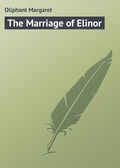
Маргарет Олифант
The Sorceress (complete)
CHAPTER LIII
What more is there to say? It is better, when one is able to deal poetic justice all round, to reward the good and punish the evil. Who are the good and who are the evil? We have not to do with murderers, with breakers of the law, with enemies of God or man. If Aubrey Leigh had not been exceedingly imprudent, if Bee had not been hot-headed and passionate, there would never have been that miserable breach between them. And the Sorceress, who destroyed for a time the peace of the Kingsward family, really never at any time meant that family any real harm. She meant them indeed, to her own consciousness, all the good in the world, and to promote their welfare in every way by making them her own. And as a matter of fact she did so, devoting herself to their welfare. She made Colonel Kingsward an excellent wife and adopted his children into her sedulous and unremitting care with a zeal which a mother could not have surpassed. Her translation from scheming poverty to abundance, and that graceful modest wealth which is almost the most beautiful of the conditions of life, was made in a way which was quite exquisite as a work of art. Nobody could ever have suspected that she had been once poor. She had all the habits of the best society. There was nowhere they could go, even into the most exalted regions, where the new Mrs. Kingsward was not distinguished. She extended the Colonel’s connections and interest, and made his house popular and delightful; and she was perfect for his children. Even the county people and near neighbours, who were the most critical, acknowledged this. The little girls soon learned to adore their step-mother; the big boys admired and stood in awe of her, submitting more or less to her influence, though a little suspicious and sometimes half hostile. As for baby, who had been in a fair way of growing up detestable and a little family tyrant, his father’s new marriage was the saving of him. He scarcely knew as he grew up that the former Miss Lance was not his mother, and he was said in the family to be her idol, but a very well disciplined and well behaved idol, and the one of the boys who was likely to have the finest career.
Charlie, poor Charlie, was not so fortunate, at least at first. The appointment which Colonel Kingsward declared he had been looking out for all along was got as soon as Charlie was able to accept it, and he left England when he was little more than convalescent. People said it was strange that a man with considerable influence, and in the very centre of affairs, should have sent his eldest son away to the ends of the earth, to a dangerous climate and a difficult post. But it turned out very well on the whole, for after a few years of languor and disgust with the world, there suddenly fell in Charlie’s way an opportunity of showing that there was, after all, a great deal of English pluck and courage in him. I do not think it came to anything more than that – but then that, at certain moments, has been the foundation and the saving of the British Empire in various regions of the world. There was not one of his relations who celebrated Charlie’s success with so much fervour as his step-mother, who was never tired of talking of it, nor of declaring that she had always expected as much, and known what was in him. Dear Charlie, she said, had fulfilled all her expectations, and made her more glad and proud than words could say. It was a poor return for this maternal devotion, yet a melancholy fact, that Charlie turned away in disgust whenever he heard of her, and could not endure her name.
Bee, whose little troubles have been so much the subject of this story, accomplished her fate by becoming Mrs. Aubrey Leigh in the natural course of events. There was no family quarrel kept up to scandalise and amuse society, but there never was much intercourse nor any great cordiality between the houses of Kingswarden and Forestleigh. I think, however, that it was against her father that Bee’s heart revolted most.







